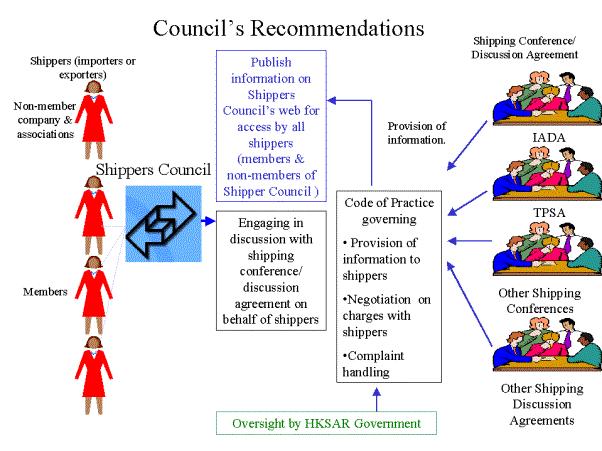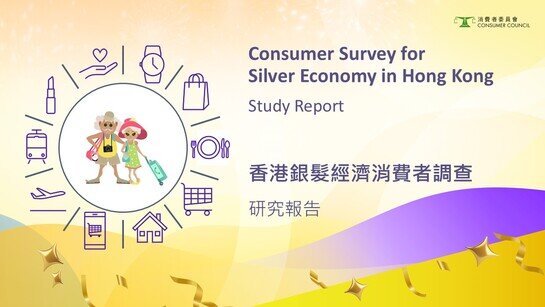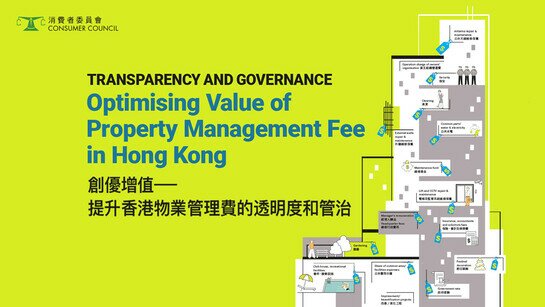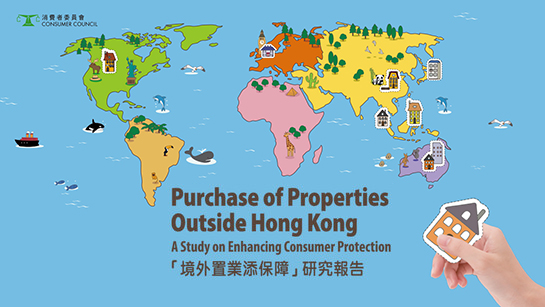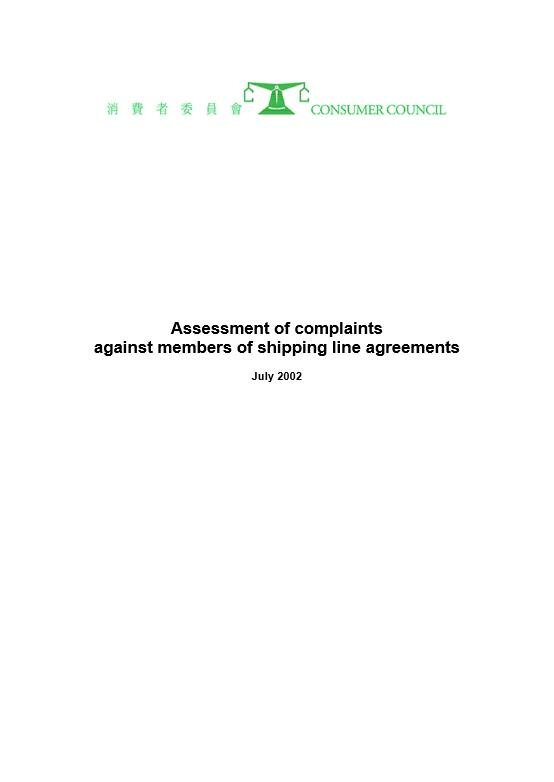
Executive Summary
- Competition issues have long been subjects of Council's studies. This Report outlines two complaints made to the Council alleging anti-competitive conduct engaged in by a collective group of shipping lines providing container liner shipping services to Hong Kong shippers (importers/exporters). The Consumer Council has a concern with such allegations, given the effect that any market distortion could have on consumer welfare, through increased costs for Hong Kong businesses that could be passed on to consumers.
- The complaints relate to the manner in which a Yen Appreciation Surcharge (YAS) and Terminal Handling Charge (THC) are determined and imposed by competing container liner members of collective groups of shipping lines. The groups are commonly known as 'conference agreements' and are a common feature of international shipping.
- With regard to the YAS complaint, it was alleged that the YAS did not reflect contemporary movements in the exchange rate, and as a result this lead to losses by importers/exporters because tariffs were higher than they should have been, taking into account the exchange rate that applied at the time of transportation. With regard to the THC complaint, it was claimed that the charge had been increasing at an unchecked rate since its introduction in 1990 resulting in a situation where Hong Kong shippers, as of May 2001, were paying the highest THCs in the world.
- Since there is an element of pricing uniformity in the conference agreement members' operations, as far as charges are concerned, the conduct of the conference agreements raises a genuine concern and comes within the category of business conduct that, according to the Government's Statement on Competition Policy, requires close scrutiny.
- While the procedures followed by conference agreement members appear to provide some transparency in regard to the matters agreed or discussed by member shipping lines, the procedures do not satisfy all the shippers who use those services. For instance, the complainants who do not belong to the Shippers Council. In addition, there is also the wider issue of whether the effect of the collaborative efforts by the conference agreement members raises a concern as to the reasonableness of the terms and conditions of tariffs and surcharges, such as the THC or YAS.
- In view of the Government's preferred sector specific policy approach to competition policy, the Council suggests the Port and Maritime Board (as the sector-specific agency with responsibility for this sector) should take on the role of facilitating the following processes.
Competition analysis
- A process should be introduced whereby any allegations of restrictive practices by members of shipping line agreements (such as conferences or discussion agreements) are examined to ascertain whether:
- a service provided by shipping lines in co-operation with each other is subject to effective competition from lines that do not belong to the co-operative agreement;
- where a shipping line agreement exists, the terms of the agreement allow each individual line to offer individual services, outside the agreement, if the line so chooses; and
- where a shipping line agreement exists, the parties to the agreement demonstrate that there is a public benefit in the agreement that outweighs the inherent detriment to competition that would be expected to arise.
- a service provided by shipping lines in co-operation with each other is subject to effective competition from lines that do not belong to the co-operative agreement;
Facilitating effective negotiation
- When competitors agree with each other on matters that could otherwise be subject to competition, a concern naturally arises that shippers will not be able to negotiate a better deal for themselves, in terms of a low cost service, wider product choices, and higher quality of service.
- In view of the concern that arises from the market power held by aggregations of competitors, the Council considers that a mechanism should be established that provides some countervailing power for shippers when attempting to negotiate terms and conditions.
Introduce transparency
- The Hong Kong Shippers' Council has agreed to disseminate details of any new charges, or changes in the levels of current charges to their members and Hong Kong shippers in general through circulars and the "Shippers Today" magazine, as and when IADA furnish them with details. Likewise, the Secretary for IADA has also agreed and made a commitment to give the Hong Kong Shippers' Council due notification whenever there are changes in IADA's recommended surcharge items which may impact the Hong Kong shipper/consignee. The Consumer Council believes that those measures when implemented will go a long way to help improve communication and transparency, avoiding misunderstandings.
Self-regulation
- In the long run, the Council considers that in the absence of its preference for a general competition law in Hong Kong, and the Government's encouragement of self regulatory measures to govern competitive safeguards, that an industry code of practice could be introduced:
- to provide an appropriate degree of transparency, and opportunity for those who use the services of lines party to the agreements to negotiate terms and conditions;
- to obtain information that justifies any claimed cost recovery mechanisms built into service agreements; and
- to provide a complaint handling mechanism for any persons aggrieved with the actions of the members of shipping agreements. (Such a mechanism has been advocated in a general sense by the Hong Kong General Chamber of Commerce in its 'Chamber Statement on Competition'.)
- to provide an appropriate degree of transparency, and opportunity for those who use the services of lines party to the agreements to negotiate terms and conditions;
- In this regard, the liner shipping industry could be requested to develop a code of practice that addresses the issue of competition, along the self-regulatory lines preferred by Government, and which provides for the above safeguards and complaints handling mechanism.
- The Port & Maritime Board noted that improved arrangements to increase transparency were facilitated and brokered through the mediation efforts of the Board. The Shippers Council has also used its web page to show details of charges as well as their advice to shippers on these charges. The Consumer Council believes that these measures will go a long way to help improve communication and transparency, avoiding misunderstandings in the market. A diagrammatic representation of the Council's recommendations can be found at Figure 1 attached to this report.
- The Council has a statutory function of encouraging business and professional associations to establish codes of practice to regulate the activities of their members. Accordingly, the Council would be pleased to make its resources available to work with government and industry in assisting with the development of a self-regulatory a code.
Figure 1